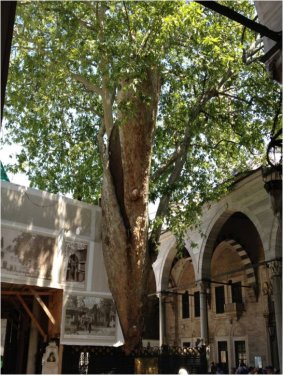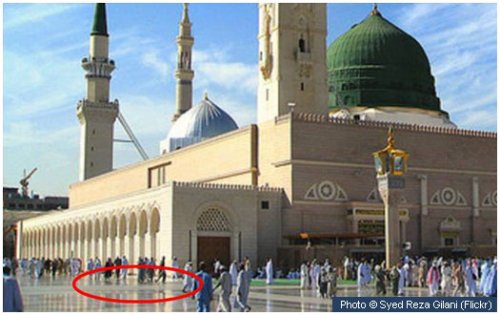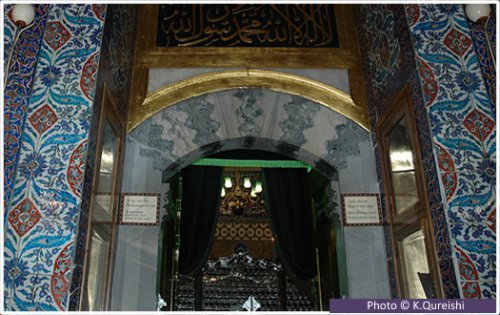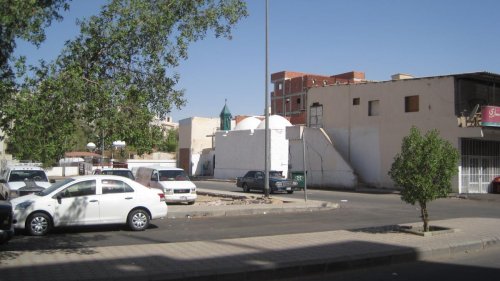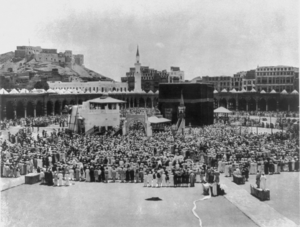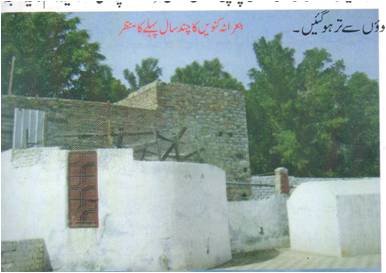-
Posts
8,464 -
Joined
-
Days Won
773
Content Type
Profiles
Forums
Events
Everything posted by ummtaalib
-

Sayyidina Umar (RA) - A Glimpse into his Life
ummtaalib replied to ummtaalib's topic in Prophets, History & Biographies
Peace with the Inhabitants of Jerusalem All the battles which resulted during the era of the successors of Rasulullaah (SallAllaahu alayhi wasallam) were engaged to protect the Muslims and were for defence. The intention of the Muslims was neverto kill, maim of to cause disruption and distress. Once, in the midst of battle, the inhabitants of Jerusalem, Baitul Muqaddas were constrained to make peace. They stipulated a condition that the Commander of the Believers must come personally andissue a peace pact written by his own hands. Hadhrat Abu Ubaidah (RadhiAllaahu-anhu), a renowned Companion, was the commander-in-chief of the army. He, too, yearned to have peace without fighting and bloodshed. There were few among the Muslims who said: "Of what significance are these impoverished people! We have triumphed over the entire Syria. We have implanted our flagstaff on enormous forts. If we make this pact, it will mean that we have made it under pressure." It was resolved that the sentiments of the inhabitants of Jerusalem be communicated in writingto the Commander of the Believers. His verdict would be conclusive. When this news reached Madinah, Hadhrat Umar (RadhiAllaahu-anhu) conferred with the Sahaaba. Some were of the opinion that this request should not be approved and the city should be seized by force.Others emphasised that if by Hadhrat Umar's (RA) going to Jerusalem thousands of people's lives would be salvaged and the work accomplished without bloodshed, he should definitely go. Hadhrat Umar (RadhiAllaahu-anhu) said: "My opinion is to go Jerusalem". He departed from Madinah. When he left for his journey there were no troops accompanying him nor was there any band playing music; no flags, and no bodyguards walked ahead of or behind. He wore simple clothes and rode a horse. He gave instructions to the commanders to proceed to Jaabiya. When the commanders came they adorned very decorative, long gowns. On seeing this Hadhrat Umar (RadhiAllaahu-anhu) began to throw pebbles at them and said: "Have you abandoned the simplicity of the Arabs and become non-Arabs (Persians)?" When the commanders removed their cloaks revealing that they were all armed with weapons, Hadhrat Umar (RadhiAllaahu-anhu) felt content. The commanders said : "O Commander of the Believers! We are only adorning splendid clothes on account of the enemies, lest they classify us for some destitute, desolate people. Otherwise we are Muslims, and one does not become a Muslim by wearing fine clothes". When the peace pact was signed Hadhrat Umar (RadhiAllaahu-anhu) inspected Jerusalem with the Christian leaders. These Christian leaders showed him a Church when the time of Salaat approached. The Christian leaders requested : "Perform your Salaat here". The Commander of the Believers, Hadhrat Umar (RadhiAllaahu-anhu) said: "If I perform Salaat here today the Muslims will express tomorrow that our Khaaleefa performed Salaat here. This place is yours. Your Church will become a matter of controversy". By bearing these subjects in mind Hadhrat Umar (RadhiAllaahu-anhu) did not perform Salaat in the Church. -

Sayyidina Umar (RA) - A Glimpse into his Life
ummtaalib replied to ummtaalib's topic in Prophets, History & Biographies
War Techniques Hadhrat Umar (RadhiAllaahu-anhu) issued guidelines to the commanders concerning troop manoeuvres, their organisation and dissemination, All these matters were mandated by means of writing letters to the people concerned. He provided counsel about these proceedings so explicitly as if the battle-field lay before his eyes. He was constantly perturbed whenever a battle was in progress : "I do not know whether the Muslims have obtained victory in the battle or have endured defeat." Once a battle was fought against the Iranians (Persians). Today there are Muslims in Iran, but in those days they were not Muslims. They continued being derogatory to the Arabs, especially to Rasulullaah (Sallahu Alahi Wasalaam). Iran had one very courageous leader named Rustam. He was so powerful that he is still remembered today, and about a powerful person we say that he is as strong as Rustam. A battle was waged in an Iranian city called Qudisiya. Rustam was also fighting in this battle. Rustam's army retreated before the Arab army approached and did not hold ground in the battle-field. So Rustam also dashed for his life and jumped into a stream. He swam briskly, rotating his arms and feet. An Arab soldier, named Bilaal, grabbed Rustam's leg, jerked it and cut it off. During this ferocious battle Hadhrat Umar (RadhiAllaahu-anhu) rose at dawn everyday and went outside Madinah in order to obtain news of the battle from the messengers before anyone else. His concern for the Muslims was so great. One day he was standing in anticipation when he saw a rider approaching on a camel. What did this naive fellow know that this person clad in simple and patched clothes is that very same Khaleefa of the Muslims whose armies had overthrown the Throne of Iran! -

Sayyidina Umar (RA) - A Glimpse into his Life
ummtaalib replied to ummtaalib's topic in Prophets, History & Biographies
The Miracle during his Khilaafah There was an army commander in Nahaawand, named Saariya. When the enemy's army exerted great pressurehe became scared. Nahaawand was many miles away from Madinah. There was neither telephone, nor electricity in Madinah. While Hadhrat Umar (RadhiAllaahu-anhu) was delivering a Khutba he exclaimed, " O, Saariya! Get to the back of the mountain and fight the enemies firmly so that there remains no fear of them attacking from the rear. Do not flee!"Saariya heard the voice in Iraq and saw Hadhrat Umar (RadhiAllaahu-anhu) standing and exclaiming. The people of Madinah who were listening to the khutba became amazed that he spoke about Saariya going to the back of the mountain. Once the Salaat terminated the people enquired: "Sir, what mention was that about Saariya?" Hadhrat Umar (RadhiAllaahu-anhu) said: Saariya was apprehensive of the pressure by the enemies. I conversed with him concerning that."After a long time when the messenger from Iraq arrived he stated the time and day when they had heard Umar's (RadhiAllaahu-anhu) voice, and that Saariya had actually seen Hadhrat Umar (RadhiAllaahu-anhu) exclaiming. From this we can judge what an illustrious saint Umar (RadhiAllaahu-anhu) was, and the level of his spiritual status. -

Sayyidina Umar (RA) - A Glimpse into his Life
ummtaalib replied to ummtaalib's topic in Prophets, History & Biographies
His Serving the People Hadhrat Umar's (RA) prevailing law was that the country's disabled, old and maimed should all receive an allowance from the treasury, whether they be Muslims, Christians, or people of any other religion. He would frequently go and give the daily stipulated allowances of his people himself. He worked for the people of his vicinity and his neighbours. He brought people's commodities from the bazaar. He did not boast about being the leader of the Muslims. He delivered letters of soldiers to their homes personally and would express: "Keep your reply ready ! When the messenger goes your letter will also be given to him". If there was no ink or ink-pot at anyone's home, he brought it. If there was no one to write at any home he sat at the door and wrote whatever the family people dictated. He would then read the letter back to them. He gave these letters personally to the messenger. He ate simple food, wore plain clothes and did not have lavish dishes. Hadhrat Umar (RadhiAllaahu-anhu) was an authority on genealogy family ties. In his youth he did athletic exercises, wrestled and arranged wrestling bouts. He would sit so rigidly on a horse as if he was fused to it. Oratory Skills Hadhrat Umar (RadhiAllaahu-anhu) attained distinction in oratory and poetry. When he became a Muslim he discarded these. During the period under discussion very few Arabs could read and write. During the time of Rasulullaah (SallAllaahu alayhi wasallam) there were only 17 persons among the Quraish tribe who could read and write and among them was Hadhrat Umar (RadhiAllaahu-anhu). Because of his business ventures he travelled to Iraq and Syria, and frequently had the opportunity of meeting very affluent people. He was seasoned in travelling and he understood business transactions so well that he had a full mastery of its basis. Initially, he was a great enemy of Islaam. If any weak Muslim ever came under his control he would beat him or her very viciously. There was a maid-servant named Sabeena who became a Muslim. Hadhrat Umar (RadhiAllaahu-anhu) had supervision over her. He clobbed the poor servant very cruelly and when he became exhausted, he said: "I am just retrieving my breath before commencing to beat you again". But he became a Muslim he proved to be such a Muslim that narrations about him will remain till Qiyaamat. al-Islaam -
اﻟﻠﻬُﻢﱠ ﺻَﻞﱢ ﻋَﻠَﻰ ﻣُﺤَﻤﱠﺪٍ وﱠ ﻋَﻠَﻰ ﺁلِ ﻣُﺤَﻤﱠﺪٍ وﱠ أَﻧــْﺰِﻟْﻪُ اﻟْﻤَﻘْﻌَﺪَ اﻟْﻤُﻘَﺮﱠبَ ﻋِﻨْﺪَكَ (الطبراني O Allah, shower your choicest durood (blessings) on Hadhrat Muhammad (Sallallahu Alaihi Wasallam) and upon the family of Hadhrat Muhammad (Sallallahu Alaihi Wasallam), and grant him the lofty position of maqaam-e-mahmood on the day of Qiyaamah. A Benefit of Reciting Durood In Roudhul Faa’iq, Sufyaan Thauri (Rahmatullahi Alaihi) relates: “Once when performing Tawaaf, I saw a man doing the same. Throughout his entire Tawaaf , he was only reciting durood upon Rasulullah (Sallallahu Alaihi Wasallam) at every step, and did not recite any tasbeeh, tahleel etc. When I asked him the reason, he replied: “And who are you?” I replied: “I am Sufyaan Thauri.” He then said: “Had you not been the only scholar of your calibre, I would not have revealed something which is my secret. My father and I went for Hajj. Enroute my father fell ill. While I was doing my utmost to treat him, he suddenly passed away, and his whole face turned black.” This distressed me greatly (and seeing that this was a bad sign) I said, “Inna lillah.” I then covered his face with a cloth. Soon thereafter my eyes closed and I fell off to sleep in this sorrow. In a vision I saw a man approaching. I had never seen a man as handsome as he, clothes as clean as his, and a fragrance as sweet as his. He approached in haste, removed the cloth from my father’s face, and put his hand over his face. Immediately the face turned white. As he was about to depart, I held onto him and asked, “May Allah Ta’ala have mercy upon you. Please tell me who are you, for Allah Ta’ala has shown mercy to my father in his great need because of you.” He replied: “Do you not recognize me? I am Muhammad (Sallallahu Alaihi Wasallam), the son of Abdullah, the person of the Qur’an. Your father was a very great sinner, but he always recited durood upon me abundantly. Hence, when through his sins, evils descended on him, I saw his great need and hastened to assist him, as I do for all those who recite durood upon me.” (Fazaail Durood) Ihyaaud Deen يَا رَبِّ صَلِّ وَ سَلِّمْ دَائِمًا أَبَدًا عَلَى حَبِيبِكَ خَيرِ الخَلْقِ كُلِّهِمِ
-
- 1
-

-
Neighbor's Wi-Fi Question: I have question about using neighbours wifi, if by mistake their internet wifi connects on my devices and I use it without knowing its theirs, am I accountable for that, is that stealing and haram? Answer: In the Name of Allah, the Most Gracious, the Most Merciful. As-salāmu ‘alaykum wa-rahmatullāhi wa-barakātuh. It is narrated on the authority of Abū Hurayrah (radiyallahu 'anh) that the Messenger of Allah (sallallahu 'alayhi wa sallam) said: كُلُّ الْمُسْلِمِ عَلَى الْمُسْلِمِ حَرَامٌ مَالُهُ، وَعِرْضُهُ، وَدَمُهُ حَسْبُ امْرِئٍ مِنَ الشَّرِّ أَنْ يَحْقِرَ أَخَاهُ الْمُسْلِمَ Everything of a Muslim is sacred to another Muslim: his property, his honour and his blood. It is enough evil for any man to despise his brother Muslim.[1] It is clear from the hadīth above that as Muslims, we should always take full caution when dealing with others and using anything that belongs to them, especially if it is without their consent. In the enquired case, although you are not liable for accidently using your neighbor's Wi-Fi[2], it is still important to inform your neighbor that you have been unintentionally using his Wi-Fi connection without his permission. If you decide to compensate your neighbor for using his Wi-Fi connection in the past, it will be an expression of your taqwā and Allah consciousness.[3] We also advise you to let your neighbor know that your devices tend to automatically connect to the nearest available Wi-Fi connection and there is a possibility that this will happen again in the future. By notifying your neighbor about this issue, you will be absolved from any accidental future usage of his connection without his permission. And Allah Ta’āla Knows Best Bilal Mohammad Student Darul Iftaa New Jersey, USA Checked and Approved by, Mufti Ebrahim Desai. www.daruliftaa.net [1] Sunan Abī Dawūd, 4882, The Book of Manners [2] الْأَصْلِ أَنَّهُ لَا يَكُونُ ضَامِنًا وَفِي الْفَتَاوَى الصُّغْرَى رَجُلٌ أَتْلَفَ شِرْبَ رَجُلٍ بِأَنْ سَقَى أَرْضَهُ بِشِرْبِ غَيْرِهِ. قَالَ الْإِمَامُ عَلِيٌّ الْبَزْدَوِيُّ: يَضْمَنُ، وَقَالَ الْإِمَامُ خواهر زاده لَا يَضْمَنُ وَعَلَيْهِ الْفَتْوَى فَتَوَهَّمَ بَعْضُهُمْ أَنَّ صَاحِبَ الْهِدَايَةِ تَنَاقَضَ حَيْثُ قَالَ هُنَا لَا يَضْمَنُ إنْ سَقَى مِنْ شِرْبِ غَيْرِهِ وَقَالَ هُنَاكَ وَلِهَذَا يَضْمَنُ بِالْإِتْلَافِ وَلَيْسَ كَذَلِكَ بَلْ مَا ذَكَرَ فِي كِتَابِ الْبُيُوعِ عَلَى رِوَايَةِ مَشَايِخِ بَلْخٍ وَمَا ذَكَرَ هَهُنَا عَلَى رِوَايَةِ الْأَصْلِ (البحر الرائق، ج ٨، ص ٢١٦، ايج ايم سعيد كمبني) أَتْلَفَ شِرْبَ إنْسَانٍ بِأَنْ اسْتَسْقَى أَرْضَهُ بِشِرْبِ غَيْرِهِ قِيلَ يَضْمَنُ وَقِيلَ لَا يَضْمَنُ وَعَلَيْهِ الْفَتْوَى كَذَا في جَوَاهِرِ الْأَخْلَاطِيِّ (الفتاوي الهندية، ج ٥، ص ٢٦٨، مكتبة رشيدية) [قال ابن عابدين] وَأَمَّا ضَمَانُهُ بِالْإِتْلَافِ بِأَنْ يَسْقِيَ أَرْضَهُ بِشِرْبِ غَيْرِهِ فَهُوَ إحْدَى الرِّوَايَتَيْنِ، وَالْفَتْوَى عَلَى عَدَمِهِ كَمَا فِي الذَّخِيرَةِ، وَهُوَ صُحٌّ كَمَا فِي الظَّهِيرِيَّةِ، وَتَمَامُهُ فِي النَّهْرِ (رد المحتار علي الدر المختار، ج ٥، ص ٨٠، ايج ايم سعيد كمبني) [3][قال الحصكفي] (وَلَا يَضْمَنُ مَنْ مَلَأَ أَرْضَهُ مَاءً فَنَزَّتْ أَرْضُ جَارِهِ أَوْ غَرِقَتْ) لِأَنَّهُ مُتَسَبِّبٌ غَيْرُ مُتَعَدٍّ وَهَذَا إذَا سَقَاهَا سَقْيًا مُعْتَادًا تَتَحَمَّلُهُ أَرْضُهُ عَادَةً وَإِلَّا فَيَضْمَنُ وَعَلَيْهِ الْفَتْوَى. وَفِي الذَّخِيرَةِ وَهَذَا إذَا سَقَى فِي نَوْبَتِهِ مِقْدَارَ حَقِّهِ وَأَمَّا إذَا سَقَى فِي غَيْرِ نَوْبَتِهِ أَوْ زَادَ عَلَى حَقِّهِ يَضْمَنُ عَلَى مَا قَالَ إسْمَاعِيلُ الزَّاهِدُ قُهُسْتَانِيٌّ (وَلَا يَضْمَنُ مَنْ سَقَى أَرْضَهُ) أَوْ زَرْعَهُ (مِنْ شِرْبِ غَيْرِهِ بِغَيْرِ إذْنِهِ) فِي رِوَايَةِ الْأَصْلِ وَعَلَيْهِ الْفَتْوَى شَرْحُ وَهْبَانِيَّةٍ وَابْنِ الْكَمَالِ عَنْ الْخُلَاصَةِ لِمَا مَرَّ أَنَّهُ غَيْرُ مُتَقَوِّمٍ وَلَوْ تَصَدَّقَ بِنُزُلِهِ فَحَسَنٌ لِبَقَاءِ الْمَاءِ الْحَرَامِ فِيهِ بِخِلَافِ الْعَلَفِ الْمَغْصُوبِ فَإِنَّ الدَّابَّةَ إذَا سَمُنَتْ بِهِ انْعَدَمَ وَصَارَ شَيْئًا آخَرَ قُهُسْتَانِيٌّ [قال ابن عابدين] (قَوْلُهُ فَحَسَنٌ) يُشِيرُ إلَى أَنَّهُ غَيْرُ وَاجِبٍ وَإِنَّمَا هُوَ لِلتَّنَزُّهِ...وَقَالَ الْفَقِيهُ: لَا آمُرُ بِهِ وَلَوْ تَصَدَّقَ بِنُزُلِهِ لَكَانَ حَسَنًا وَهَذَا أَفْضَلُ (رد المحتار علي الدر المختار، ج ٦، ص ٤٤٧، ايج ايم سعيد كمبني)
-
- 1
-

-
Sensory Sensitivities Sound This is the most commonly recognised form of sensory impairment. Hearing impairments can affect someone's ability to communicate and possibly also their balance. People with an ASD may experience the following differences. Hypo May only hear sounds in one ear, the other ear having only partial hearing or none at all. May not acknowledge particular sounds. Might enjoy crowded, noisy places or bang doors and objects. Hyper Noise can be magnified and sounds become distorted and muddled. Particularly sensitive to sound and can, for example hear conversations in the distance. Inability to cut out sounds – notably background noise, which often leads to difficulties concentrating. Example...Do you hear noise in your head? It pounds and screeches. Like a train rumbling through your ears. Powell, J. (in Gillingham, G. 1995), page 41 Source
-

Abu Ayyub Ansari (RA) - Madinah to Istanbul
ummtaalib replied to ummtaalib's topic in Prophets, History & Biographies
The Burial Site The Courtyard of Eyüp Sultan Camii. The tomb of Abū Ayyūb al-Anṣārī lies in an alcove just behind the tree. The exact burial site was soon forgotten and only rediscovered after Sultan Muhammad Fatih took Istanbul in 1453. There are many accounts of how the grave was discovered. The following are just two such accounts and Allah ta'ala knows best. When some eight centuries later Fatih Mehmet besieged the city, he and his advisors, as Evliya Çelebi writes, Philip K. Hitti provides a slightly different account than Freely of the burial place’s discovery as well as offering some details concerning Abū Ayyūb’s final campaign: Islamicana -

Abu Ayyub Ansari (RA) - Madinah to Istanbul
ummtaalib replied to ummtaalib's topic in Prophets, History & Biographies
Death He also had a distinguished military career. Much of his time was spent as a warrior until it was said of him, "He did not stay away from any battle the Muslims fought from the time of the Prophet to the time of Muawiyah unless he was engaged at the same time in another." The last campaign he took part in was the one prepared by Muawiyah RA and led by his son Yazid RA against Constantinople. Abu Ayyub RA at that time was a very old man, almost eighty years old. But that did not prevent him from joining the army and crossing the seas as a ghazi in the path of God. After only a short time engaged in the battle, Abu Ayyub RA fell ill and had to withdraw from fighting. Yazid RA came to him and asked: He asked Yazid RA to press on towards the Eastern Roman capital as far as possible and then bury his body there. When it became obvious to the Muslim army that they were unable to conquer the city, Abu Ayyub was buried outside its walls. -

Abu Ayyub Ansari (RA) - Madinah to Istanbul
ummtaalib replied to ummtaalib's topic in Prophets, History & Biographies
He enjoyed a privilege which many of the Ansar in Madinah hoped they would have. When the Prophet (peace and blessings of Allah be on him) entered Madinah he told the people to allow his camel to go her own way for “she is guided by Allah.” All of the Muslims desired that he would lodge with them. Finally the she-camel knelt, but the Prophet (peace and blessings of Allah be on him) did not dismount. The animal rose to its feet again, ambled ahead for some distance, and then turned back and knelt in the same place it had before. Masjid-e-Nabwi was erected on this very spot. Adjacent to the spot where the camel knelt was the house of Abu Ayyub Ansari (may Allah be pleased with him) who hurried to lift the saddle from the camel and took it to his home. The Prophet (peace and blessings of Allah be on him) remarked humorously, “A man must follow his saddle,” and went along with Abu Ayyub. Asad bin Zurara (may Allah be pleased with him) took hold of the halter, so he was allowed to take care of the camel. According to other reports, lots were cast and was drawn in the favour of Abu Ayyub Ansari (may Allah be pleased with him). The house of Abu Ayyub Ansari was double-storied. When it was settled that the Prophet (peace and blessings of Allah be on him) would stay at this place, he offered the Prophet (peace and blessings of Allah be on him) to stay on the upper storey but the Prophet could not agree to this proposal, as he felt that people frequently coming to meet him would disturb his (Abu Ayyub’s) family. Thus the ground floor was made vacant for the Prophet (peace and blessings of Allah be on him). Abu Ayyub (may Allah be pleased with him) sent meals to him twice a day and whatever he left uneaten was shared by Abu Ayyub and his wife. He would look at the marks of the Prophet’s (peace and blessings of Allah be on him) fingers on the food and place his own fingers at the same spots as a source of blessing.Although the Holy Prophet (peace and blessings of Allah be on him) had stayed at the ground floor according to his own wish, it was quite unbearable for Abu Ayyub (may Allah be pleased with him) and his wife that they should live upstairs while the Prophet (peace and blessings of Allah be on him) was downstairs. They were much disturbed to think that in this way they were showing disrespect to the Prophet (peace and blessings of Allah be on him). One night they could not sleep and passed the whole night sitting in a corner of the roof. In the morning Abu Ayyub (may Allah be pleased with him) came to the Prophet (peace and blessings of Allah be on him) and said, “O Prophet of Allah, we could not sleep at night but passed the whole night sitting in a corner of the roof.” When the Prophet asked the cause, he replied, “Our parents may be sacrificed on you, we always remain thinking that we are committing disrespect to you. Last night this feeling grew to the utmost and we could not sleep.” After this he requested, “O Prophet of Allah, have mercy upon us and kindly shift upstairs. We are your slave and shall remain satisfied under your feet.” The Prophet (peace and blessings of Allah be on him) granted his request and moved upstairs while Abu Ayyub and his wife moved to the ground floor. References: The History of Islam – Akbar Shah Najeebabadi, When the Moon Split – Safiur Rahman Mubarakpuri, Siratun Nabi – Allama Shibli Nomani & Syed Suleman Nadvi IslamicLandmarks -
Brother akmadkhan, assalaamu 'alaykum Welcome to the forum however i must inform you that your post has been edited with the links removed. Any form of advertisement is strictly not allowed on the forum. Please read Forum Rules your co-operation will be appreciated. Jazaakallaahu khayraa.
-
Abu Ayyub Ansari (Radhiyallahu 'anhu) His full name was Khalid ibn Zayd ibn Kulayb and he was from the Banu Najjar. He was a great and close companion of the Prophet sallallaahu 'alayhi wasallam. He was known as Abu Ayyub (the father of Ayyub). This is the approximate spot where existed the house of Abu Ayyub Ansari (may Allah be pleased with him). IslamicLandmarks This is where the Prophet (peace and blessings of Allah be on him) initially stayed for several months on his migration to Madinah, while Masjid-e-Nabwi and the adjoining rooms for his wives were being built. Buried in Istanbul His grave lies in Istanbul where he was honoured with martyrdom during the siege of Constantinople in the caliphate of Muawiyah (may Allah be pleased with him) in 48 AH. IslamicLandmarks Just beyond the city walls and alongside the Golden Horn is the district of Eyüp, named after the tomb and mosque complex built around the burial site of Abū Ayyūb al-Anṣārī (d. 52/672). Eyüp Sultan Camii Islamicana (Click on picture to enlarge) Tomb of Abu Ayyub Ansari RA *Note that this entry has been shown for information purposes only. On no account should anybody pray towards a grave or seek supplication through them as this is tantamount to committing shirk, associating partners with Allah (Glorified and Exalted is He). IslamicLandmarks
-
Masjid Al Shaykhayn (Or Al- Badai') Where night was spent on the way to the Battle of Uhud Also known as Masjid al-Dir' (Masjid of the Armour). This is where the Prophet sallallaahu 'alayhi wasallam spent the night on his way to the Battle of Uhud. There he prayed Fajr Salaah and reviewed his army. There also 'Abdullah ibn Ubayy, the chief hypocrite, decided to turn back with his three hundred, thus depriving Muslims of one third of their number. (From "Memories of the Luminous City")
-
Ruins of Masjid al Fash at Uhud مسجد الفسح This is where, after the Battle of Uhud, the Prophet sallallaahu 'alayhi wasallam and his Companions RA prayed. (From "Memories of the Luminous City")
-
Question I have heard two points in a lecture regarding procedures related to after the Nikah. 1) It is Sunnah sprinkle water on each spouse. 2) It is Sunnah for the father of the bride to go to the house of the couple and make Du’a for them. It was mentioned that Nabi (Sallallahu ‘alayhi wa sallam) went to the home of Sayyidatuna Fatimah (radiyallahu ‘anha) after the Nikah and made a certain du’a for them. I humbly request if you could please explain the steps outlined above as well as include the relevant du’as and references. Answer It is authentically reported by Sayyiduna Anas ibn Malik (radiyallahu ‘anhu) that: “……. Nabi (sallallahu ‘alayhi wa sallam) went to the home of Sayyiduna ‘Ali (radiyallahu ‘anhu) -after performing the nikah- and asked for water. Sayyidatuna Fathimah (radiyallahu ‘anha) brought the water and Nabi (sallallahu ‘alayhi wa sallam) took a sip and then gargled it out into the bowl. Consequently he sprinkled the water on her head and chest and recited: ’Allahumma inni u’idhuha bika wa dhurriyataha minash shaytanir rajim’ Translation: O Allah! I seek your protection for her and her progeny from Shaytan the accursed. Rasulullah (sallallahu ‘alayhi wa sallam) asked her to turn around and sprinkled water on her back and repeated the du’a. Nabi (sallallahu ‘alayhi wa sallam) then asked for more water and repeated the same action on Sayyiduna ‘Ali (radiyallahu ‘anhu) and recited the same du’a, by altering the suffix to the masculine tense ie. Allahumma inni u’idhuhu bika wa dhurriyatahu minash shaytanir rajim. Translation: O Allah! I seek your protection for him and his progeny from Shaytan the accursed. Nabi (sallallahu ‘alayhi wa sallam) then said to Sayyiduna ‘Ali (radiyallahu ‘anhu) “you may now proceed with your wife in the name of Allah and with the blessings of Allah” (Sahih ibn Hibban; At Taqasim Wal Anwa’, hadith: 3283, Al Hisnul Hasin, pg. 91) In other versions of the above, Rasulullah (sallallahu’alayhi wasallam) also recited the following du’a for each of them: Allahumma barik fi hima wa barik lahuma fi bina ihima Translation: O Allah Bless them and bless their union (Majma’uz Zawaid, vol.9 pg.209. Also see Hayatus Sahabah, vol.2 pg.896-898) And Allah Ta’ala Knows best Verified by: Moulana Muhammad Abasoomer hadithanswers
- 1 reply
-
- 1
-

-
Receiving the Reward of Sadaqah based on Intention عن معن بن يزيد رضي الله عنهما قال كان أبي يزيد أخرج دنانير يتصدق بها فوضعها عند رجل في المسجد فجئت فأخذتها فأتيته بها فقال والله ما إياك أردت فخاصمته إلى رسول الله صلى الله عليه و سلم فقال لك ما نويت يا يزيد ولك ما أخذت يا معن رواه البخاري (الترغيب و الترهيب 1/68 Hadhrat Ma’n bin Yazeed (Radiyallahu Anhu) reports: On one occasion my father Yazeed took out some Dinaars to give in charity. He proceeded to the Musjid and placed the Dinaars by a person in the Musjid. I went to the person and the person gave the dinaars to me. I then came to my father with the dinaars. (When my father learnt of what had transpired, he was displeased and took an oath) saying: “I did not intend giving the money to you.” I then took the matter to Rasulullah (Sallallahu Alaihi Wasallam). Upon hearing the entire story, Rasulullah (Sallallahu Alaihi Wasallam) said: “O Yazeed, you will receive the full reward for your sadaqah based on your intention,and O Ma’n, the dinaars are now yours (as it came to you through a halaal means).” Ihyaaud Deen
-
Three Electoral Commitments Every Muslim Should Make By Shaykh Mawlānā Muhammad Saleem Dhorat hafizahullāh Islamic Da'wah Academy Like the rest of the country, the UK’s Muslim community is gearing up to vote on May 22nd. The political parties have been campaigning in earnest for some time, outlining their policies and stressing their commitments to the nation. During the days preceding polling day, Britain’s Muslims should be asking themselves what commitments they have made when it comes to casting their votes. Here follows a summary of a speech delivered by Shaykh Mawlānā Muhammad Saleem Dhorat hafizahullāh, containing valuable advice for the Muslim voter. The Secret of Success Allāh ta‘ālā has placed the desire for progress, and the spirit of mutual competitiveness that accompanies it, into the very nature of man. It is natural for individuals and communities to strive to better themselves and achieve progress. As Muslims, we should open the pages of history and discover and adopt those factors which make a nation prosperous, as long as they fall within the bounds of the Sharī‘ah, so that we too can reap the Dīnī and worldly benefits of progress. Our study should commence with trying to ascertain the secret behind the success of the noble Sahābah radhiyallāhu ‘anhum, for they are ideal role models of a community that attracted success in its every endeavour. A thoughtful investigation will reveal three prominent qualities which can be attributed to their success. In this election season every Muslim, no matter what his/her preferred party, should commit him/herself to observing these three principles in order to secure success and achievement, both on a personal and a communal level. The First Commitment - Taqwā The Sahābah radhiyallāhu ‘anhum hated all disobedience to Allāh ta‘ālā, they neither had a habit of sinning nor were they fond of any sins. Abstention from sins is the essence of taqwaa, and through it Allāh ta‘ālā has promised relief from every difficulty. In dealing with the election issue, we must not say or do anything that displeases Allāh ta‘ālā. Of all the sins to beware of, backbiting and slander are major sins which are a particular threat at such times. One inclined towards a particular party should not backbite or slander a supporter of another party, for in doing so the requirements of taqwā will be compromised; and Divine assistance and blessings can not be expected in the absence of taqwā. The Second Commitment - Ikhlās Every decision taken by the Sahābah radhiyallāhu ‘anhum was for the Pleasure of Allāh ta‘ālā, keeping in mind the life hereafter and the good of the community. They would be ready to sacrifice everything for the sake of Allāh ta‘ālā. Whether standing for election, supporting a party or voting, a Muslim must be pure in his intentions. This intention should be to elect the candidate who will best serve the Muslim community in common and humanity in general. If a Muslim has sincerity then his vote will go to the right candidate, for he will consider that he is voting to please Allāh ta‘ālā and therefore he will expend his energies in finding out who the best candidate is. The Third Commitment - Unity Unity is a key factor for the success of any nation; a truly united community can withstand any competition. Individuals should have the courtesy of mutual respect despite their political rivalries. Sadly, the Muslim community is a divided one. Every individual has the right to his own opinion and his own preference, within Shar‘ī boundaries, but our mutual differences transform into malice and enmity towards each other. Not even our masājid are free from our feuding. We can only hang our heads in shame when matters reach ahead and TV and press reports announce that political wrangling amongst Muslims has spilled over into fights outside a masjid after Friday prayers. We go to the extremes; if we like something in a particular person, we praise him to the extreme, whereas if we disagree with someone on one issue, we become blind to all the good qualities he possesses. Our dealings are but a faint shadow of the Islamic concept of brotherhood our beloved Prophet sallallāhu ‘alayhi wasallam taught. True brotherhood demands that whatever our political stripe, we should be able to sit at a table and sacrifice our political allegiances for the sake of Allāh ta‘ālā and agree to support the candidate who is best for the Muslims in common and the country in general. We should be willing to marginalize our differences in order to progress in a common direction. In fact, if the Muslims of a particular constituency were to unite on a single platform and form a committee, responsible for recommending the best candidate to Muslim voters, every party would turn to the committee and seriously consider its demands on behalf of the Muslim community. They would realise the importance of securing the Muslim vote. All that is needed to achieve unity is a little sacrifice and the willingness to swallow one’s pride. May Allāh ta‘ālā grant us all the longing to strive for taqwā, ikhlās and unity. Āmīn. Using Your Vote The vote is very important. It is a means of electing the person most beneficial for the community and our country. Voting is a big responsibility. Not voting or voting incorrectly will bring power to the wrong person. The best candidate deserves our vote. We should become politically aware. We should read every party’s manifesto. We should study party policies via the internet, radio, newspapers and knowledgeable people in our communities, who possess political acumen. We should find out which party offers us the best in all spheres of life; education, housing, health, social issues, international policy etc. Deciding on a party by just looking at one issue does not constitute farsightedness. We should think rationally, not make judgements based on emotions. Finally, we should make du‘aa to Allāh ta‘ālā, asking Him to enable us to make the right choice and that may He grant success to those who will serve the country and its citizens without any prejudice or wrong.
-
May Allah ta'aal grant correct understanding of Deen without which it is not in reality, Islam!
-
The Heart is for none but Allah Once Hazrat Asraf Ali Thanvi ® was going to his house from his Khanqah. I [Mufti Muhammad Shafi ®] was going along with him as I had some works with him. Suddenly Hazrat Thanvi ® stopped and took out a pen and paper. He jotted something down on the piece of paper and out it back in his pocket. Then he asked me: “Did you understand anything (what I did)?” I answered, “No”. He explained, “I’ve jotted down on the paper the words which were in my heart. I remembered that I have a task to be accomplished after returning to the hanqah. If I had not written it down, it would have repeatedly disturbed my heart. After writing it down on the paper my heart is free from it”. Then he said, “The heart has been created for Allah Taala”. Therefore, the heart must be mainly engaged in remembrance of Allah Taala. For necessity one may bear other things in the heart; however, this should be limited. To fill the heart with secular love and thoughts is a great mischief. The difference between the Ambiya (Alaiyhimussalam), Awliaya ® and us is that both were engaged in worldly affairs; however, the previous were the perfect example of: “Hand is at work, but the heart completely absorbed in the remembrance of Allah Taala”. Source
-
The Man Who Committed 99 Murders There’s a story related in Sahih Bukhari emphasising the vastness and generousness of Allah’s mercy. The Prophet (saws) picked on certain events throughout history to show their importance. This emphasised a certain message that he was trying to convey to us. Since the events of the past are so numerous, the ones chosen to be related and preserved in his words till the end of time must be of great importance. Whenever we hear stories of the past we should always remember that Allah had chosen those stories to be related as a great occurrence. There was a man who had heartlessly murdered 99 people, when all of a sudden he felt remorse over what he had done. He asked the people in his town if they knew anyone who was pious enough to get advice from. They recommended to him an ascetic who lived in the mountains. So the man went to this learned person and told him about the past and his wishing to repent for his actions. He asked the man, “Will Allah forgive me?”. The learned man was so shocked by everything he had heard that he said “No, you will not be pardoned.” So the murderer killed him as well! He felt remorse yet again and asked the people if they knew anyone else. They recommended to him another scholar who they were acquainted with. Again, the murderer asked the same question, “Will Allah forgive me?” Being a truly wise man and knowing Allah’s all-encompassing mercy and His ability to forgive anything, the scholar replied “Of course you will be pardoned, repent at once!” The wise man also gave him some advice, telling him of a city where there were devoted worshippers of Allah. He recommended that he move there to be around them and not to come back to his town, which was the place of evil. So the man started towards that town and on the way he died. The angels of mercy descended upon him and so did the angels of punishment. They started arguing over him. The angels of mercy said “This man had repented and was seeking Allah, so he is ours.” The angels of punishment said “This man had never done anything good in his life and did not even complete his repentance.” Allah sent another angel to them in the form of a man, and both parties took him as their arbitrator. This angel said “Measure the distance of the earth between the two cities, and let him be assigned to the one he is closest to.” When the angels measured the distance, it just so happened that he was nearer the town of his destination just by a hand-span, and so the angels of mercy took away his soul to paradise. Another version narrates that Allah had ordered the earth to be stretched such that he became closer to the city of piety and further from the city of evil. Lessons: Allah’s mercy is all-encompassing and He can forgive any sin, even the most heinous such as murdering 100 people, at least 1 of whom was a pious person After repenting from a sin, we should always immediately take steps to avoid returning to it again We should not fall into despair when we sin, because if we repent and turn back to Allah, He will help us be among those who are forgiven
-
Ajyad Fortress on the Bulbul Hill The Ajyad Fortress was built during the Ottoman era on the Bulbul Mountain overlooking the Haram in Makkah. It was demolished in 2002 for commercial development of the Abraj Al-Bait Towers. The Ajyad Fortress in the background - 1889
-
A young innocent girl sacrifices her all to become her husband's when she says "Yes" to her Nikah. How much sacrifice do we make for the One, when we say "Laa-ilaaha illallaah"? Shaykh Ashraf Ali Thanwi ra
-
Story of Suraaqa ibn Maalik RA At the time of the Hijra (the migration from Makka to Medina), the Prophet (saws) and Abu Bakr were being chased across the desert. The Quraysh were pursuing them and had a bounty of 100 camels placed on the Prophet’s head. Motivated by the large reward, one of the best trackers in Makka, Suraqa Ibn Malik, went riding on his horse looking for the Prophet (pbuh) every which way until he found him. Dressed in his armor and sword, Suraqa attempted to kill the Prophet but as soon as he would approach him, his horse would sink into the sand and not budge. He tried several times.... Read story.... Bracelets of Kisra.pdf Well of Ja'raa' - Place where Suraaqa ibn Maalik RA accepted Islam
-
Advices Hazrat Maulana Yunus Patel (Rahmatullahi 'alayh) There are so many of us who very foolishly and ignorantly pride ourselves over our wealth, family name, beauty – sometimes even our knowledge of Deen or the services we are rendering of Deen; considering these as the criteria for establishing our superiority over others. Whenever the nafs asserts itself with : ‘I am better… than him (or her)’, we should understand that we are on the same footing as shaytaan. When Allah Ta’ala commanded the angels to bow down to Hazrat Aadam (AS), shaytaan refused to do so. When asked as to why, he asserted : ‘I am better than he. You created me from fire, and him from clay.’ [surah A’raaf 7 :12] This opinion of : ‘I am better…’ is reason enough for serious concern, since this attitude is what is termed as pride (takabbur), arrogance and conceit (ujub), the cancer of the spiritual heart. This is such an ailment which also leads to the evil of boasting. Allah Ta’ala states : “Verily Allah does not like the one who has pride and is boastful.” [surah An-Nisaa 4 : 36] “And swell not your cheek (for pride) at men, nor walk in insolence through the earth; for Allah loves not any arrogant boaster.” [surah Luqman 31 : 18] Allah Ta’ala makes evident His abhorrence by humiliating and abasing such a person and reducing the person’s esteem in the eyes of people. It has been related from Rasulullah (Sallallaahu ‘alayhi wasallam): “…he who is proud will be abased by Allah, for though he considers himself great, he is lowly in the eyes of men to such an extent that he is of less value in their estimation than a dog or a pig.”[5] Source Ibn Hazm Al’Andulasi, Rahmatullahialay “If you take pride in your physical strength, remember that the mule, the donkey, and the bull are stronger than you and better suited to carrying heavy loads. If you feel vain about the lightness of your running style, remember that the dog and the hare surpass you in this field. It is extremely curious that rational beings feel proud of something in which they are surpassed by dumb animals.”

